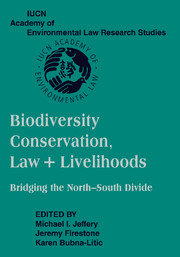 Biodiversity Conservation, Law and Livelihoods: Bridging the North-South Divide
Biodiversity Conservation, Law and Livelihoods: Bridging the North-South Divide Published online by Cambridge University Press: 31 July 2009
I begin with a claim that is to me self-evident, but that does not seem to reflect legal scholarship: Law is a behavioural discipline. Its function is to shape how people act. It shares this with economics, marketing, political science, and psychology (to name but a few). Although the literature of the law is populated with examples of weird, wonderful, and frightening aspects of behaviour, legal mainstream legal literature rarely discusses the causes of (or strategies to alter) behaviour, perhaps with the exception of some arguments about the deterrent value of punishment (particularly the death penalty). The focus of that literature is legal instruments and legal interpretation. It contains very little enlightenment about the behavioural effectiveness of law, or the strategies through which desired outcomes could be more efficiently achieved. Neither legal practice nor legal theory are engaged in a scientific discourse about the mechanisms through which (for example) punishment (or the fear of it) works, its limits, or the ways in which public information about rules or judgments impacts within the general community to shape hopes, fears, and resultant behaviour. The idea that one might trade off policing investment for education, or manage transaction costs better to allow for more effective use of resources, is a discussion that is largely foreign to the mainstream legal literature.
Which leads me to the more challenging statement: Law is a behavioural discipline, sadly bereft of a behavioural theory.
To save this book to your Kindle, first ensure [email protected] is added to your Approved Personal Document E-mail List under your Personal Document Settings on the Manage Your Content and Devices page of your Amazon account. Then enter the ‘name’ part of your Kindle email address below. Find out more about saving to your Kindle.
Note you can select to save to either the @free.kindle.com or @kindle.com variations. ‘@free.kindle.com’ emails are free but can only be saved to your device when it is connected to wi-fi. ‘@kindle.com’ emails can be delivered even when you are not connected to wi-fi, but note that service fees apply.
Find out more about the Kindle Personal Document Service.
To save content items to your account, please confirm that you agree to abide by our usage policies. If this is the first time you use this feature, you will be asked to authorise Cambridge Core to connect with your account. Find out more about saving content to Dropbox.
To save content items to your account, please confirm that you agree to abide by our usage policies. If this is the first time you use this feature, you will be asked to authorise Cambridge Core to connect with your account. Find out more about saving content to Google Drive.